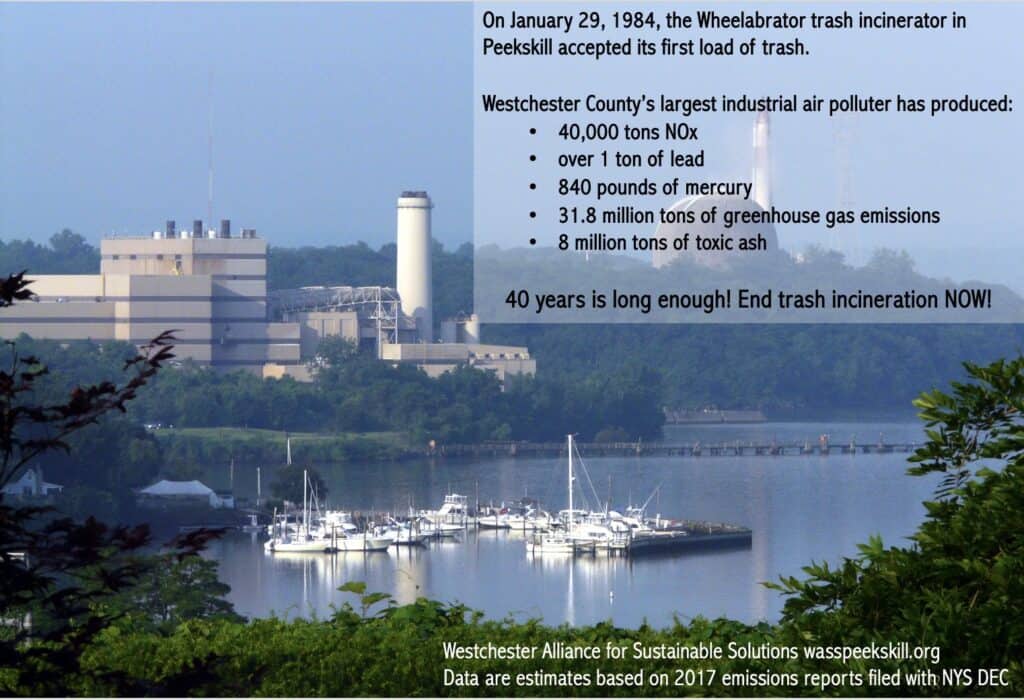
Environmental Justice Op-Ed by Climate Action Council member Raya Salter and Dr. Courtney Williams of Westchester Alliance for Sustainable Solutions
On January 29, Westchester’s trash incinerator, the Wheelabrator, will mark its 40th birthday. Put away your party hats because this is no cause for celebration. Did you know that Westchester vast majority of Westchester County’s garbage is burned in Peekskill at the Wheelabrator? Did you know that Westchester’s trash incinerator is the largest industrial air polluter in the county? And did you also know its emissions contribute the F we get from the American Lung Association for our county air quality?
If you didn’t, you’re not alone. Most people in Westchester don’t realize where their trash goes after they put it on the curb. Even some of Peekskill’s residents who breathe the pollution every day don’t realize what the smoke stack is that they can see from their window, hear from their couch, and smell from their porch. It is no surprise that some of the richest communities in the nation send their garbage to a largely Black and Brown city with more than its fair share of poverty.
Whether you call it Wheelabrator, Resco, or WIN-Waste, its presence in Peekskill has dubbed us a Disadvantaged Community. According to New York State, Peekskill’s pollution burden is worse off than 98% of census tracts in the entire state, thanks in large part to the incinerator. It means we’re bearing an undue burden and are ill-equipped to cope with the health and climate effects.This is environmental injustice and it’s hurting us all. So what are we throwing away and where else could it go?
Westchester County currently sends 2500 tons of ‘garbage’ to Wheelabrator in Peekskill every day. It’s not just about what we’re throwing away, but also where it could alternatively go. A staggering 90% of the waste incinerated at Wheelabrator is recyclable. This includes everyday items like food scraps, paper, metals, and plastics. The true potential lies in reimagining this ‘waste’ as resources—compost for gardens, raw material for new products.
Westchester County is already working to reduce waste, including a CompostED facility in Valhalla, a Materials Recovery Facility in Yonkers, food scraps recycling, and a new textile recycling program announced this month. Working together, we can scale and improve these programs!
One big step forward is the $90,000 that Westchester County included in the 2024 budget for a waste reduction study. If the county plays its cards right, this $90,000 could make a plan to get us off expensive trash incineration and on our way to Zero Waste- with good jobs, cleaner air, and healthier kids along the way. We urge the County to adopt a Zero Waste goal, like the ones in Ulster County and New York City, to help get us across the finish line.
It’s important to note that we also need State officials to step up for environmental justice. New York’s landmark climate act demands that emissions and co-pollutant reductions be prioritized in frontline communities. According to a recent state audit, the Department of Environmental Conservation must do more to protect the community of Peekskill. The aging and polluting Wheelabrator maintains operations as we speak on a permit that officially lapsed in 2021 and has been in “staff extended” limbo ever since.
It was on January 29, 1984 when the first load of trash was brought to the “garbage-to-energy” plant in Peekskill. At the time it seemed like a good idea to turn trash into power. Now we know that it has led to poor air quality and environmental injustice in Westchester. It doesn’t have to be this way! We can build a system to manage our waste that protects public health, sustains our planet, and doesn’t drain our pocketbooks. Let’s make Wheelabrator’s 40th birthday its last – and close the trash incinerator.





